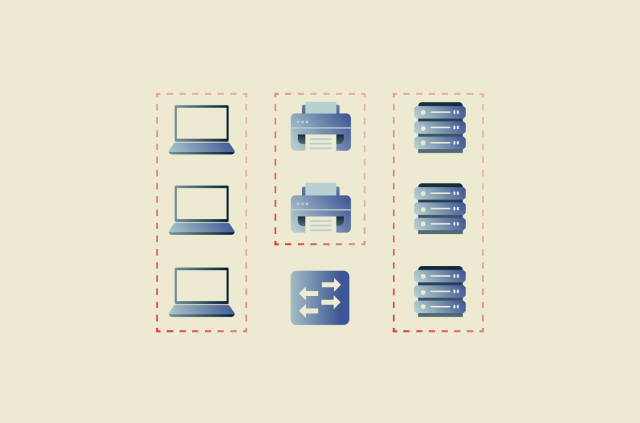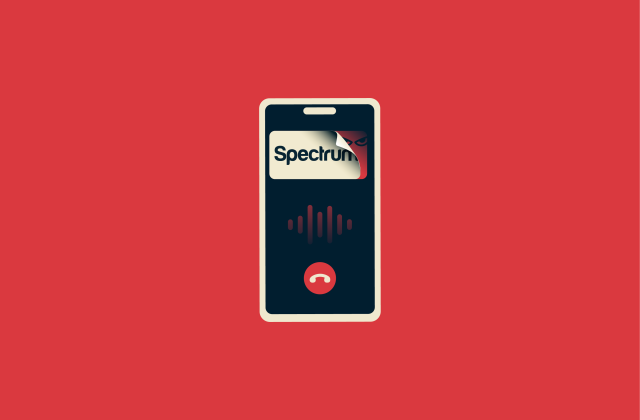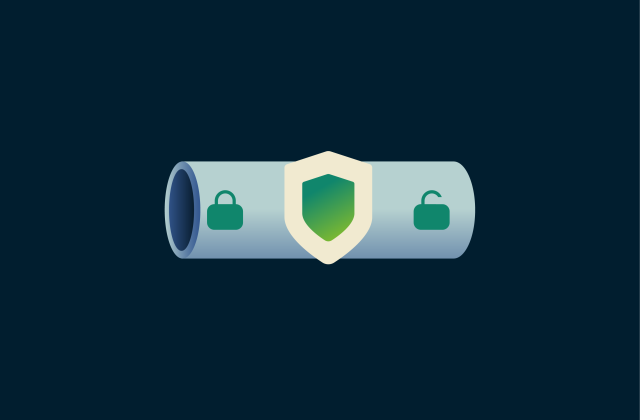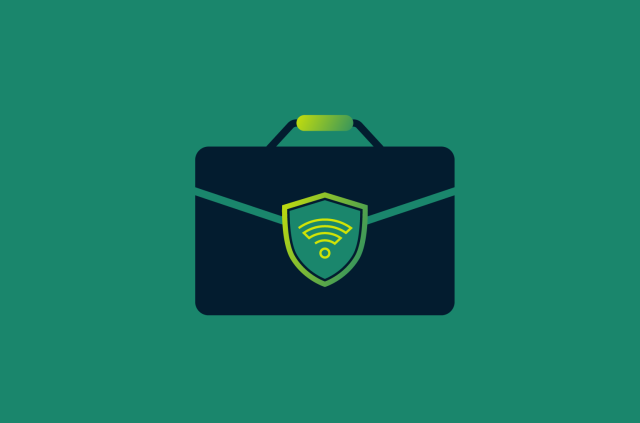IKEv2 vs. OpenVPN: Which VPN protocol should you choose?
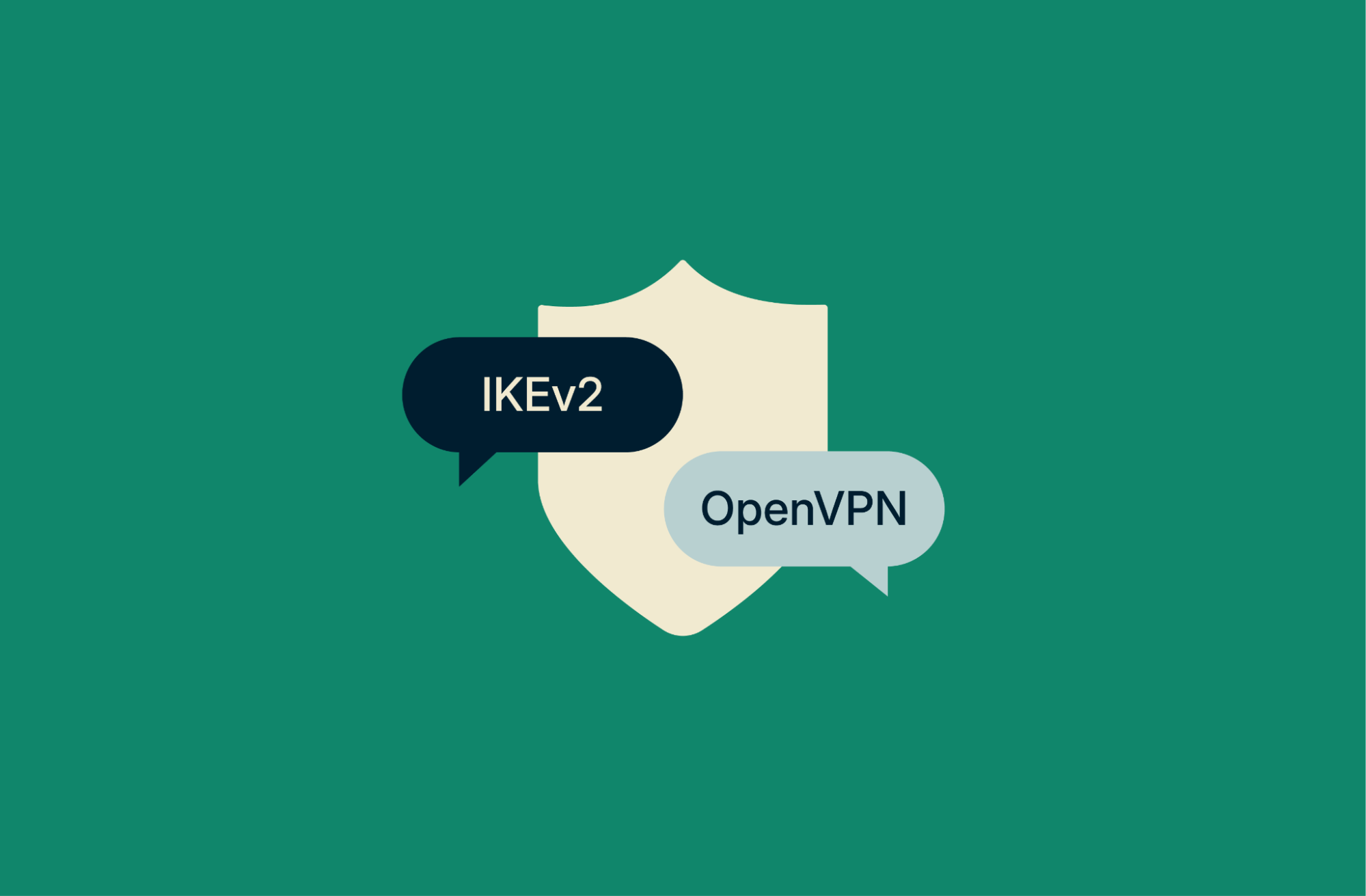
The protocol you choose impacts your experience of using a VPN, and Internet Key Exchange version 2 (IKEv2) and OpenVPN are both popular options. Each comes with distinct strengths and trade-offs. IKEv2 is known for quick connections and reliable performance on mobile devices, while OpenVPN stands out for robust protection and versatile configuration options.
In this guide, we’ll explore use cases like streaming and gaming and compare the two protocols in terms of speed, security, and stability. Whether you’re new to VPNs or an experienced user, this side-by-side comparison will help you decide which protocol best suits your needs.
What is IKEv2?
IKEv2 is a protocol developed by Microsoft and Cisco. It’s almost always used alongside Internet Protocol Security (IPsec), a security framework that manages encryption. Together, IKEv2 and IPsec form a VPN protocol that’s used to create a secure, private connection between a device and the internet.
Note: Though it’s more accurate to say “IKEv2/IPsec,” the combination of the two protocols is often referred to simply as IKEv2, which is what we’ll call the pair in this guide.
How does IKEv2 work?
IKEv2 establishes a secure tunnel between a device and the VPN server. It starts by authenticating both ends, ensuring that the connection is legitimate. Next, it works with IPsec to determine the encryption methods that will protect the user’s traffic.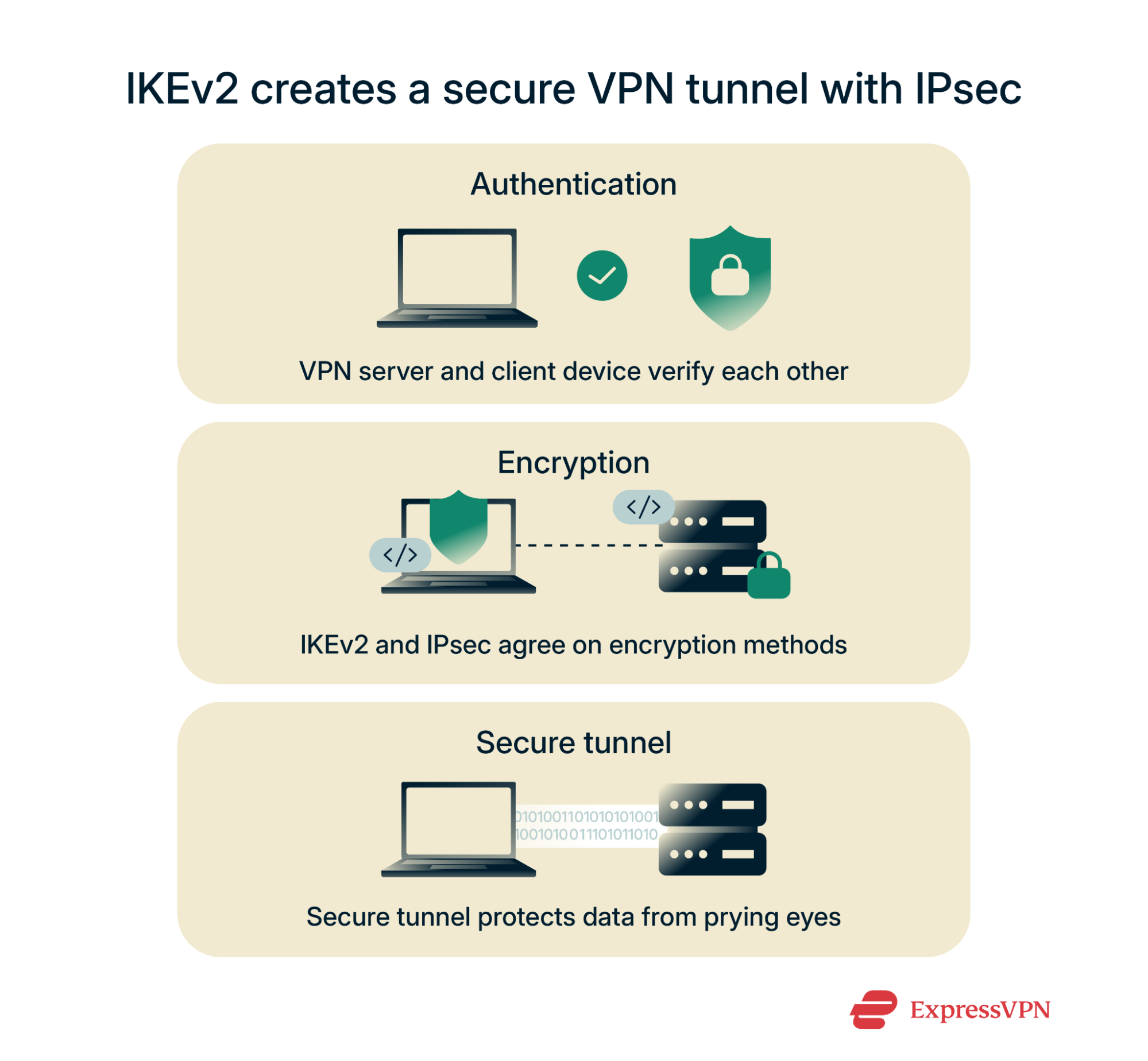
Once the tunnel is active, the user’s internet data passes through it in an encrypted form, hidden from prying eyes. You can learn more about this protocol by checking out our IKEv2 guide.
What is OpenVPN?
OpenVPN is an open-source VPN protocol. Unlike IKEv2, it isn’t bound up with IPsec. Instead, OpenVPN uses the OpenSSL library, which is also employed to protect most secure websites. This provides strong encryption standards and makes the protocol highly adaptable.
OpenVPN can run over either the User Datagram Protocol (UDP) or Transmission Control Protocol (TCP), and it can be configured to use almost any port number. TCP and UDP are two common ways of sending data online. When it’s configured to run on TCP port 443, OpenVPN’s traffic resembles regular HTTPS traffic to the network.
How does OpenVPN work?
Like IKEv2, OpenVPN creates a secure tunnel between your device and a VPN server by encrypting all data that passes through. First, it uses digital certificates or login credentials to confirm that the connection is legitimate. Once this is done, it applies advanced encryption methods to scramble data so that it can’t be read by outsiders even if they manage to harvest it.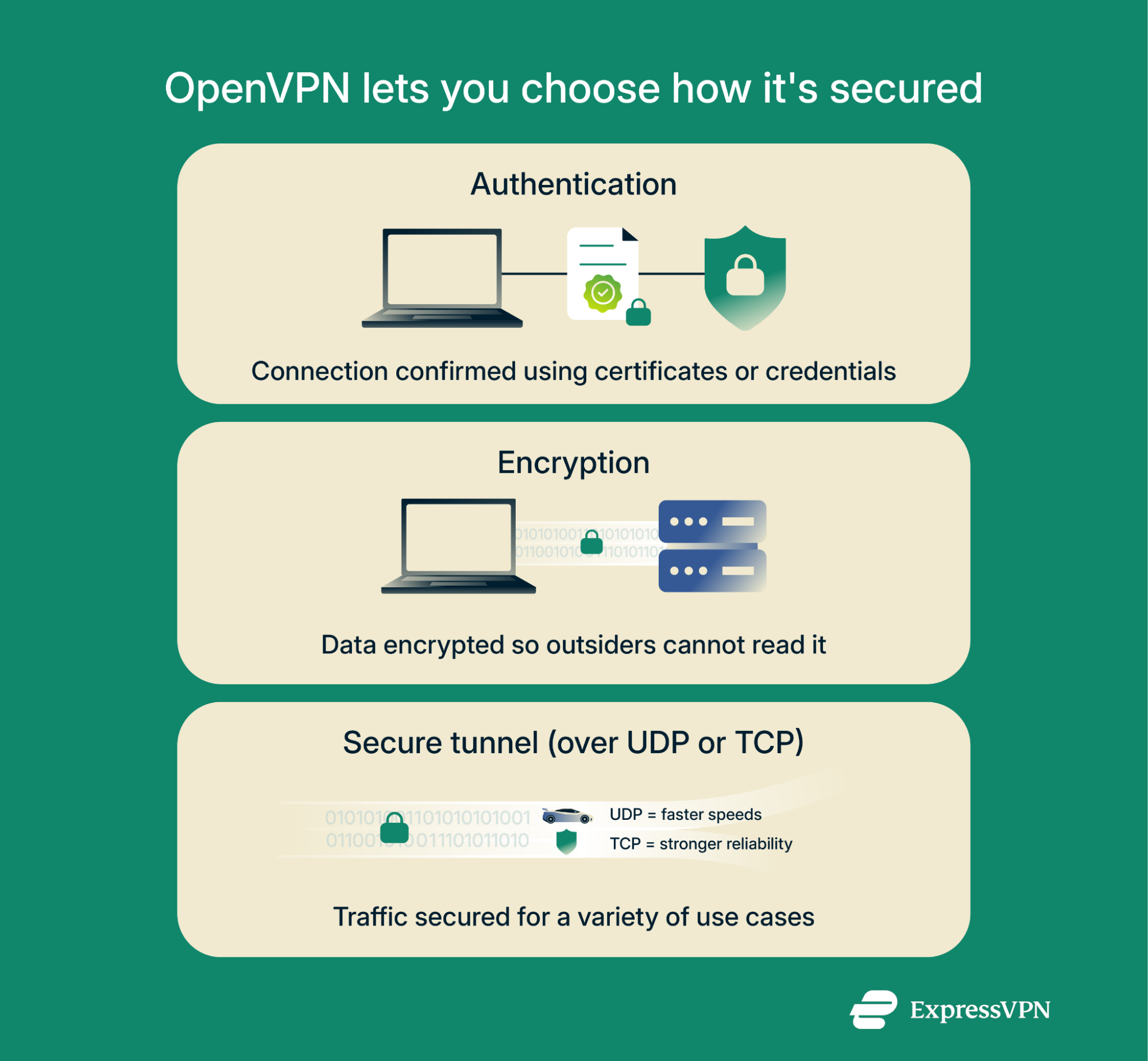
Depending on whether it’s set to use UDP or TCP, OpenVPN can prioritize either speed (UDP) or reliability (TCP), with TCP traffic being harder to block. This flexibility allows it to work well in many situations, whether you’re gaming, streaming, or looking to maximize your online privacy.
Similarities between IKEv2 and OpenVPN
While IKEv2 and OpenVPN work differently under the hood, they share several important qualities. Both aim to provide a secure, private, and stable connection. Here’s a breakdown of how the two protocols line up:
- Strong security: IKEv2 and OpenVPN protect data from potential snoops by employing various encryption technologies. Advanced Encryption Standard (AES) is the most widely used method and is regarded as very secure. OpenVPN also supports Triple Data Encryption Standard (3DES) and Blowfish, which, though now deprecated, may still find limited uses on old hardware.
- Perfect Forward Secrecy (PFS): Both protocols create a fresh encryption key for each session. This means that even if someone gets hold of a key, they can’t use it to decrypt past or future activity.
- Privacy: In terms of privacy, IKEv2 and OpenVPN are quite strong. Each will hide your real IP address, limiting how easily websites, apps, and other online services can track you. This can help prevent targeted ads and make your browsing more anonymous, especially to sites where you don’t log in.
- Regular updates and reliability: The latest versions of IKEv2 and OpenVPN don’t have any known serious security issues. They are actively updated and audited by experts. For VPN users, this adds reassurance, as each protocol has withstood scrutiny over an extended period of time.
- Support for most devices: Both protocols run on most major systems like Windows, macOS, iOS, and Android. While IKEv2 is not natively supported on Linux, effective third-party packages are available. This gives you the flexibility to protect your laptop, phone, or tablet with the same VPN protocol.
Key differences between IKEv2 and OpenVPN
To make an informed choice of VPN protocol, it helps to understand how IKEv2 and OpenVPN differ in real-world use. The following breakdown compares their key features, from speed and security to mobile performance.
Speed and performance
IKEv2 is generally faster because it is lightweight and optimized for quick data transfers. OpenVPN can be slower, especially when using TCP. This is because TCP checks that each packet of data arrives in the correct order, resending any that are lost. While this makes the connection very reliable, the extra overhead results in slower performance compared to protocols focused on speed.
Encryption strength and overall security
Both OpenVPN and IKEv2 are secure protocols, but they handle encryption differently. OpenVPN offers more customization, letting users choose from a variety of encryption algorithms and security settings.
IKEv2 is also secure, but it relies mainly on IPsec’s built-in encryption options. This makes it simpler to use and more efficient, especially on mobile devices, but also restricts flexibility when it comes to tweaking security settings.
Connection stability with reconnect features
A feature called Mobility and Multihoming Protocol (MOBIKE) helps IKEv2 quickly restore VPN sessions if your internet drops. It allows IKEv2 to switch between networks without starting a new session. As a result, it’s better at keeping users connected when switching between Wi-Fi and mobile data.
OpenVPN doesn’t have this feature, so it often needs more time to re-establish the tunnel after a drop. Though once a connection is established, OpenVPN is usually very stable.
Device compatibility across platforms
Open-source and supported natively on many platforms, OpenVPN works on almost all devices and platforms. It can even run on routers and niche systems, making it very versatile.
IKEv2 is also widely supported but may not work out of the box on some outdated systems. That said, because it’s more lightweight and efficient, it can be a better option on old or resource-poor hardware.
Streaming quality and gaming experience
OpenVPN offers strong security, but its extra encryption can reduce speed. IKEv2 is usually faster and smoother for gaming because it has lower latency and uses fewer resources. However, IKEv2 is blocked more often since it relies on IPsec, which uses fixed ports.
Mobile vs. desktop usage
IKEv2 is particularly well-suited for use on mobile devices, handling network switches without interruption. OpenVPN is reliable on desktop but less convenient for use on the go, as it was designed for stable, fixed connections.
Benefits and drawbacks of IKEv2
IKEv2 is fast and efficient, making it great for gaming, video calls, or any activity where speed matters. It’s also lightweight, which means it doesn’t drain as much battery on mobile devices.
Another big advantage is its ability to maintain VPN connections even when switching between networks. This is important for users who frequently move between Wi-Fi and mobile data.
As for the downsides, IKEv2 isn’t as flexible as other protocols and can sometimes be blocked on restrictive networks.
Benefits and drawbacks of OpenVPN
OpenVPN is one of the more secure and versatile VPN protocols around, offering strong encryption and plenty of customization options. It works on nearly all devices, making it a reliable choice if you’re looking for broad compatibility.
However, it can be slower than IKEv2, especially when using TCP, and it demands more processing power, which may affect performance or battery life on some devices. Setting it up can also be more complex compared to some other protocols.
IKEv2 vs. OpenVPN: Side-by-side comparison table
| Category | IKEv2 | OpenVPN |
| Encryption support | Typically paired with AES, 3DES, or ChaCha20 (via IPsec) | Supports a wide range of ciphers via OpenSSL, including AES, ChaCha20, Camellia, Blowfish, and others |
| Authentication methods | IPsec authentication (certificates, Extensible Authentication Protocol (EAP), pre-shared keys) | Certificates, username/password, pre-shared keys, and hardware tokens |
| Transport protocols | UDP port 500 (IKE) and UDP port 4500 (for NAT traversal); limited flexibility in port choice | UDP or TCP (almost any port) |
| Operating system support | iOS, Android, macOS, and Windows; Linux support requires additional configuration | iOS, Android, macOS, Windows, Linux, BSD, and more |
| Codebase | Standardized, relatively small, and simple | Relatively large |
How to choose the right VPN protocol for your needs
Choosing a VPN protocol depends on what matters most to you, whether it’s speed, security, or another factor.
When to use IKEv2
Choose IKEv2 if you need speed and reliability, especially on mobile devices. It’s a great option for gaming, video calls, or mobile use, since it quickly recovers from network drops and uses less battery. If you often switch between Wi-Fi and mobile data, IKEv2 will keep your VPN session running without interruptions.
When to use OpenVPN
Go with OpenVPN if your main concerns are privacy, compatibility, and flexibility. It’s a solid choice for streaming, accessing services, and circumventing blocks. OpenVPN may not always be the fastest, but its strong security and ability to get around firewalls make it more dependable than IKEv2 in some settings.
When to use something else
In some situations, a different VPN protocol may be more suitable. For example, ExpressVPN’s Lightway Turbo protocol maximizes speed without using too many resources, making it a strong choice for nearly any use case. Other protocols can still be useful for specific scenarios, so check out this guide to VPN protocols to learn about their respective strengths.
FAQ: Common questions about IKEv2 vs. OpenVPN
Is IKEv2 more secure than OpenVPN?
In practice, both Internet Key Exchange version 2 (IKEv2) and OpenVPN are considered highly secure against current threats. IKEv2 itself does not provide any encryption, but this isn’t an issue, as it is almost always paired with Internet Protocol Security (IPsec), which brings a high level of security that’s on par with OpenVPN's suite of encryption methods. The two differ in terms of speed, flexibility, and reliability, but both are secure VPN protocols.
Is IKEv2 a good VPN?
Yes. Internet Key Exchange version 2 (IKEv2) is a secure VPN protocol that works well on mobile devices. Its speed, stability, and ability to quickly reconnect after network changes make it excellent for gaming, streaming, or traveling. While it may not be the best VPN protocol for every use case, it’s very reliable for everyday privacy.
Is IKEv2 faster than WireGuard?
No. WireGuard is a modern VPN protocol that usually outperforms Internet Key Exchange version 2 (IKEv2) in terms of speed. WireGuard’s lightweight design and codebase make it faster for most activities, including gaming and streaming. IKEv2 is still fast and efficient, but WireGuard often offers lower latency and slightly better performance overall.
Is IKEv2 faster than OpenVPN?
Yes, Internet Key Exchange version 2 (IKEv2) is typically faster than OpenVPN. Its lightweight design and efficient handling of data make it ideal for mobile and high-speed connections. OpenVPN can be slower, especially when using the Transmission Control Protocol (TCP), because it prioritizes reliability over raw speed.
Which VPN protocol is the most secure?
Security varies across VPN protocols, so the best choice depends on your settings and priorities. OpenVPN and Internet Key Exchange version 2 (IKEv2) are widely regarded as strong and reliable choices, but they’re not the only options. Depending on your needs, another protocol may serve you better; for example, Lightway, which combines strong security with excellent speed and efficiency.
Does OpenVPN or IKEv2 work better on mobile devices?
In most cases, Internet Key Exchange version 2 (IKEv2) is better for mobile users than OpenVPN. The Mobility and Multihoming Protocol (MOBIKE) protocol helps it to quickly reconnect when a user switches between Wi-Fi and mobile networks, and it’s efficient in terms of resource and battery use. OpenVPN is also reliable but may drain more battery and take longer to restore a dropped connection.
Which is better for streaming and gaming, IKEv2 or OpenVPN?
Internet Key Exchange version 2 (IKEv2) offers lower latency, making it better for gaming and real-time interactions. OpenVPN is also pretty fast but is usually preferred for its ability to get around restrictions. So while IKEv2 is generally faster, both might be useful for VPN users who play online games or stream video content.
Take the first step to protect yourself online. Try ExpressVPN risk-free.
Get ExpressVPN





